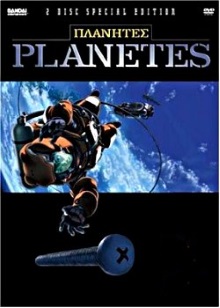
I’m always looking for interesting shows to watch and this anime series came to my attention on Broken Forum when someone called it practically the inspiration for Gravity. Combined with how it’s a self-contained, close-ended story and how long it has been since we’ve watched an anime, I put this on our “to watch” list.
Twenty-six episodes later, I find myself pleasantly surprised by the quality of its writing and its rigorous attention to detail. True, since it’s still a seinen anime it is forced to offer a cheery ending and it suffers from the usual trope of hope and love conquering everything. But if you can forgive these slights, there is plenty to like.
First of all, the stories encompass an impressive breadth of the issues that surround humans living and working in space. These include the inherent danger of radiation to anyone living outside of Earth’s protective atmosphere, how humans who grow up and live entirely off planet develop a different biology, how much sheer fun it can be to perform fantastic feats in a low-gee environment and so forth. There is also the usual human drama that is found at the core of all good stories. Not only does the series tell these stories well, within the strictures of its genre, but by intelligently translating them to space, adds freshness to the familiar story beats.
Then there is the general realism and relatively accurate grasp of science. All the technology portrayed is plausible and understandable. Astronauts have thrusters built into the forearms of their space suits. These emit propellants to enable them to maneuver in space. Space ships and areas in space stations that have no gravity are designed with plenty of handholds and footholds to help people remain in place. Heck, it outdoes Gravity in every way by showing that that different orbits have different orbital energy and how thrust is used to move between orbits.
Most of all, this is all tied together by the sheer love of space and space development that the whole series exudes. It’s great that this is balanced out by the frank demonstration of its dangers: industrial accidents, being caught in unpredictable solar flares, and the observation, so central to the series’ main plot, that space development is not a panacea for humanity’s problems and it will just be another battleground for the usual conflicts that we are so familiar with.
Yet this does not diminish the joy and sense of awe of living and working in space, the beauty of the Earth seen from orbit and a universe full of stars as the backdrop, the elegance that a skilled EVA specialist can dance in zero-gee, the coolness and power of rockets and spaceships and the sense of achievement of being able to build cities on the Moon and send expeditions to the rest of the Solar System.
Finally, the cast of characters is impressively diverse, even if they all inexplicably speak Japanese as the common language. The two protagonists are Japanese of course, but there are also Americans, Russians, Germans, Chinese etc. I kept hoping that the main story would highlight this diversity to the terrorists who oppose space development. While it remains true that outrageous inequality still exists on Earth itself, it seems self-evident from the show that everyone is more or less equal in space.
There are plenty of other things to complain about, such as the very abrupt turn towards being grimdark near the end only to about-face on an upbeat note for the finale, and the not very satisfying conclusion to the INTO – Space Defence Front conflict. As but hard sci-fi shows go, this is as good as it gets. I’d recommend it highly to sci-fi fans.